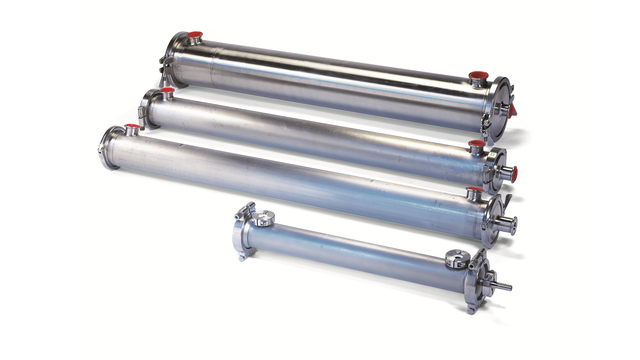Membrane ausiliarie
Alfa Laval provides everything you need for a complete membrane filtration system. We also offer a wide range of special ancillary equipment, fittings and accessories needed for installing the membranes used in spiral-wound and plate-and-frame systems, and for operating them safely and efficiently
The gentle alternative
Alfa Laval is one of the world's major suppliers of industrial separation technologies. We have a proud tradition of providing virtually all industries with separation equipment based on centrifugal and mechanical principles. However, there are may processes in which the substances involved are too delicate to be able to withstand such treatment. And for those processes we take price in offering a gentle alternative viz. cross-flow membrane filtration.
Alfa Laval is the world's leading supplier of crossflow membrane filters and equipment for sanitary use. High-hygiene Alfa Laval membrane products are the preferrred choice for many leading users of membrane filtration technology, as well as for OEM suppliers of membrane filtration modules and systems.
Getting the performance right
The efficiency of Alfa Laval's membrane filtration systems depends heavily on the reliable, uninterrupted application of auxiliary equipment, specially designed for supporting and optimizing the plant output.
Alfa Laval is unique in being able to also provide our customers with a comprehensive range of auxiliary membrane equipment, such as tailormade membrane housings, installation devices, heat exchangers, control instruments, tank equipment and valves. All our auxiliary membrane equipment is approved for pressure classifications up to 60 bar to resist membrane filtration processes requiring high operating temperatures.
Alfa Laval also offers a wide selection of high-pressure pumps of sanitary standard with carefully selected flow characteristics to control the flow across the membranes.
Benefits
- wide range of special ancillary equipment, fittings and accessories
- full spectrum available from one single expert source
- short delivery times and efficient logistics
- all components dovetailing perfectly
- all materials in compliance with FDA regulations and suitable for food and pharmaceutical applications
One expert source
By choosing Alfa Laval as your preferred supplier of membrane filtration systems and auxiliary membrane equipment you benefit from efficient logistics, from all the components dovetailing perfectly, and the advantages of purchasing the full spectrum of sanitary equipment and fittings from one single expert source.
How does membrane filtration work
Physical separation
Membrane filtration is a physical separation process in which the driving force is the difference in pressure between the two sides of a special membrane. This process is characterized by the ability to separate molecules of different sizes and characteristics.
Almost all industrial membrane filtration is carried out as cross-flow filtration, where the liquid being filtered flows parallel to the membrane at high velocity and under pressure.
Physical barrier
In its most basic terms, membrane filtration involves passing a single feed stream through a membrane system that separates it into two individual streams, known as the permeate and the retentate. The membrane that separates them is a physical barrier with highly specialized characteristics - a barrier that only certain selected components in the feed stream can pass through.
Passing through
The pores of such membrane material are so small that they are measured in Angstrom (10-10 m), and pressure is required to force the liquid through them. In fact, the pores in the membranes used for nanofiltration and reverse osmosis are so small that they cannot be seen even with a scanning electron microscope.
Compliances
All materials used for the production of Alfa Laval membranes, in both spiral-wound and flat-sheet membrane designs and configurations, comply with EU Regulation (EC) 1935/2004, EU Regulation 10/2011, EU Regulation (EC) 2023/2006 and FDA regulations (CFR) Title 21. The membranes are thus suitable for use within food and pharmaceutical processing applications.
These compliance also extend to the equipment and fittings related to membrane operations, including items such as plate-and-frame units, element housings and pumps.

